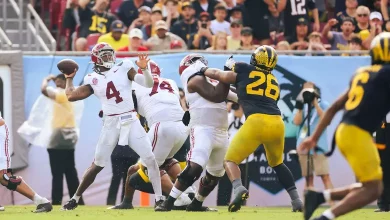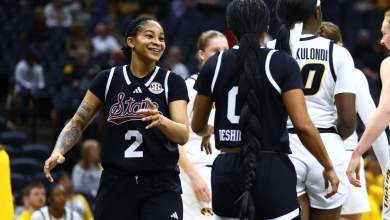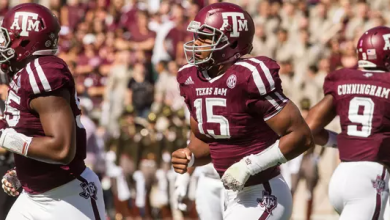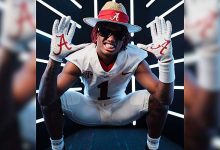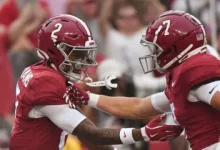Donald Trump will create a presidential commission to address ongoing issues in college athletics, and Nick Saban could be involved.
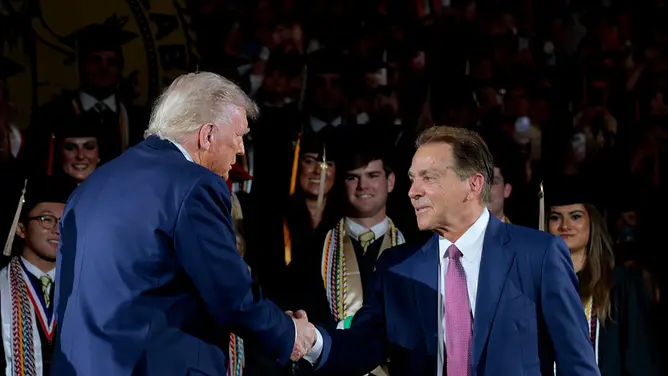
In recent years, the landscape of college athletics in the United States has been undergoing significant change. From shifting compensation structures for athletes to concerns about equity and fairness, the world of college sports has faced a series of challenges that have sparked debate among policymakers, college administrators, coaches, athletes, and fans alike. In response to these ongoing issues, former President Donald Trump has announced plans to create a presidential commission to address these concerns and find solutions to improve the state of college athletics in America. One of the most intriguing aspects of this development is the potential involvement of high-profile college football coach, Nick Saban, in the commission’s work. With his extensive experience in college athletics, leadership skills, and influence within the sports world, Saban’s participation in this commission could bring a unique and valuable perspective.
The Need for Reform in College Athletics
The need for reform in college athletics has been made evident by several high-profile issues that have come to the forefront in recent years. One of the most prominent is the question of compensation for college athletes. For decades, NCAA rules prohibited college athletes from receiving any form of payment beyond their scholarships, leading to accusations of exploitation, particularly in revenue-generating sports like football and basketball. The landscape began to shift with the advent of the NIL (Name, Image, and Likeness) rights movement, which allows athletes to profit off their personal brand, but questions remain about the fairness and effectiveness of these new policies.
Moreover, the college athletics system has faced criticism over disparities between schools, conferences, and sports programs. Elite football programs, often located in major conferences like the Southeastern Conference (SEC), enjoy vast financial resources, while smaller schools and lesser-known sports struggle to compete. Issues like Title IX compliance, athlete welfare, mental health concerns, and the pressures placed on college athletes have further fueled the calls for reform.
In addition, the debate over conference realignment, particularly within college football, has intensified in recent years, with schools shifting conferences to capitalize on television rights and access to the College Football Playoff (CFP). This has led to concerns about the loss of regional rivalries and the negative impact on the student-athlete experience.
Trump’s decision to create a presidential commission on college athletics comes in response to these and other ongoing challenges. The commission’s goal will be to bring together experts, policymakers, and leaders in the world of college sports to discuss these issues and propose solutions that can help restore integrity, equity, and fairness to college athletics.
The Role of Nick Saban in College Athletics
Nick Saban, the head coach of the University of Alabama’s football program, is widely regarded as one of the most successful and influential coaches in the history of college sports. With six national championships and numerous conference titles to his name, Saban has built a dynasty in college football, transforming Alabama into one of the most dominant programs in the sport. His success on the field is complemented by his reputation as a leader, mentor, and advocate for his players off the field.
Given his stature and experience, Saban has been a vocal figure in the discussions surrounding college athletics reform. He has expressed concerns about the impact of NIL deals on the fairness of college football, especially as they pertain to recruiting and the balance of power between programs. Saban has also been an advocate for the well-being of college athletes, particularly when it comes to ensuring that they have the resources and support they need to succeed both academically and athletically.
Saban’s involvement in the presidential commission would bring an invaluable voice to the table, as he is one of the most respected figures in college sports. His unique perspective as a coach at one of the premier football programs in the country would allow him to speak to the practical challenges facing college programs and their athletes. Moreover, Saban has a track record of navigating complex issues, from the integration of technology in training to the recruitment of top-tier talent, and his insights could help shape policies that benefit both athletes and institutions.
Trump’s Vision for College Athletics
Former President Trump’s announcement of a presidential commission on college athletics comes at a time when the NCAA and college sports in general are facing unprecedented scrutiny. Throughout his presidency, Trump was a vocal advocate for a range of issues, including the need for reform in areas like healthcare, education, and labor. Now, as a private citizen, Trump has turned his attention to college sports, where he sees an opportunity to address what he perceives as systemic problems.
One of the central issues Trump is likely to focus on is the fairness of the current system in college athletics. Trump has long expressed dissatisfaction with the concentration of power and wealth in the hands of a few elite programs, particularly in college football. His vision for the commission may include proposals to level the playing field, ensuring that smaller programs and athletes in non-revenue sports have more equitable opportunities to compete and succeed.
In addition, Trump’s commission could address the growing influence of NIL deals in college sports. While Trump has generally been a proponent of free-market principles, he may look for ways to ensure that NIL deals are structured in a way that doesn’t disrupt the balance of competition in college sports. This could involve developing guidelines for NIL compensation, ensuring transparency, and setting limits to prevent programs with more resources from gaining an unfair advantage in recruiting.
Key Issues the Commission Could Address
- Athlete Compensation and NIL Rights
- The introduction of NIL rights has reshaped the college athletics landscape, but the system remains in flux. The commission could examine ways to standardize NIL agreements, ensuring that athletes are fairly compensated while also preventing abuses such as pay-for-play schemes. There may also be discussions about how to balance NIL compensation with the student-athlete experience.
- Equity and Fairness in College Athletics
- Disparities between major football programs and smaller schools have led to an uneven playing field in college sports. The commission could explore strategies to promote fairness and equality, such as revenue-sharing models or creating opportunities for smaller programs to succeed in the highly competitive world of college football.
- Mental Health and Welfare of Athletes
- College athletes face immense pressure, both on and off the field. Mental health concerns have become a focal point in recent years, and the commission could propose policies to improve athlete welfare. This might include expanding access to mental health services, reducing the strain of recruiting and performance expectations, and enhancing resources for academic success.
- Conference Realignment and the Future of College Football
- With college football conferences undergoing significant realignment, the commission may look into the long-term impacts of these changes. While the expansion of the CFP and the growing dominance of certain conferences have increased revenue, they have also led to questions about the integrity of the sport and its future structure.
- The Role of the NCAA
- The NCAA has long been the governing body of college athletics, but its authority has come under question in recent years. The commission could explore potential reforms to the NCAA’s role, whether through restructuring its governance or implementing new policies that address the evolving needs of college sports.



